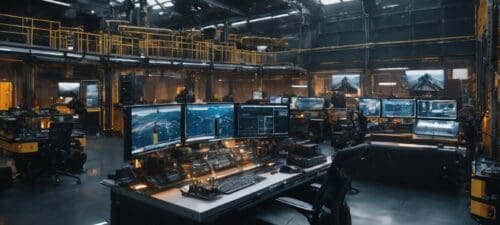Atlas Reactor: Turn-Based Strategy Meets MOBA

Updated On: February 14, 2024 by 
Are you in search of a gaming experience that perfectly blends strategic depth with the thrill of real-time action? Rest assured, your quest resonates with many; we too yearned for such excitement and have scoured the gaming landscape to unveil a true treasure.
Our upcoming article offers an insightful exploration into ‘Atlas Reactor’, a realm where snap decisions, cooperative gameplay, and tactical acumen reign triumphant. Prepare yourself for a captivating journey through our words as we elevate turn-based combat to exhilarating new vistas!
Key Takeaways
- Atlas Reactor revolutionised the gaming scene by merging turn-based strategy with MOBA gameplay, offering simultaneous turn-based action in a 4v4 match setting.
- Developed by Trion Worlds, this free-to-play game attracted players with its diverse roster of characters known as Freelancers and incorporated strategic depth through unique abilities and team roles.
- The game stood out for its innovative mechanics and received praise from both players and critics. It even held promise for competitive play in the eSports scene before its eventual shutdown.
- Regular seasonal updates enriched Atlas Reactor’s content with new characters, maps, and events to maintain player engagement and continuously evolve the playing experience.
- Despite ceasing operations, Atlas Reactor remains a significant example within the gaming industry for successfully blending two distinct genres to create a tactical yet fast-paced multiplayer experience.
Overview of Atlas Reactor
Atlas Reactor is a unique blend of turn-based strategy and MOBA, offering a fresh take on multiplayer tactics. The game combines the depth of chess-like strategic gameplay with the reflexes and competitive edge of real-time strategy.
Description of the game
In Atlas Reactor, we step into the futuristic world as Freelancers, skilled heroes who engage in 4v4 tactical battles. Each match is a high-stakes chess-like showdown where our strategic decisions matter every second.
We have to think ahead and predict opponents’ moves, combining sharp reflexes with carefully laid plans.
We dive into simultaneous turn-based gameplay that tests our competitive edge. It blurs the lines between traditional turn-based strategy games and real-time MOBA action. Choosing from a diverse roster of characters, each with unique abilities, we craft teams to outsmart and overpower rivals on the battlefield for ultimate victory.
Unique combination of turn-based strategy and MOBA
Blending the elements of a turn-based strategy game with those of a MOBA, Atlas Reactor offers an innovative and compelling gaming experience. The fusion of tactical gameplay with real-time action makes it stand out in the multiplayer online battle arena genre.
Players are immersed in simultaneous turn-based gameplay, where they strategise and make decisions while anticipating their opponents’ moves, akin to chess-like strategic gameplay.
This unique combination sets Atlas Reactor apart from traditional real-time strategy games and turn-based tactics titles, creating an engaging and dynamic experience for both seasoned players and newcomers to the genre.
Gameplay
Atlas Reactor offers a unique blend of turn-based strategy and MOBA gameplay, where players take simultaneous turns to plan their actions. The game features team-based tactical combat that is reminiscent of games like DOTA and XCOM, providing a challenging and rewarding experience for players.
How the game works
Atlas Reactor is a multiplayer, team-based game that combines turn-based strategy with MOBA elements. Players take on the role of Freelancers and engage in simultaneous turn-based combat. Here’s how the game works:
- Players form teams of four Freelancers and compete against each other in live, turn – based combat.
- Each player takes their turns simultaneously within a time limit, adding an element of real – time strategy to the gameplay.
- The objective is to outmaneuver and outwit the opposing team using tactical positioning, abilities, and teamwork.
- The game features a diverse cast of characters with unique abilities, allowing for strategic depth and variety in gameplay.
- Freelancers have different roles such as damage dealers, support characters, and tanks, adding another layer of strategical decision-making.
- Matches are fast – paced and require quick thinking, coordination with teammates, and adaptability to dynamic situations.
- The fusion of real-time tactics with MOBA-style combat creates a chess-like strategic experience unlike any other game in its genre.
- Atlas Reactor’s innovative gameplay has garnered praise for its ability to blend turn – based strategy with competitive multiplayer elements.
- The game’s free-to-play model ensures accessibility for all players while offering potential for competitive play in the eSports scene.
- Despite eventually ceasing operations, Atlas Reactor remains a notable example of successfully combining turn-based strategy with MOBA elements.
Simultaneous turn-based action
Transitioning from the detailed mechanics of how the game works, let’s delve into Atlas Reactor’s unique selling point – simultaneous turn-based action. Unlike traditional turn-based games where players wait for their opponents to make their move, Atlas Reactor introduces a real-time element by having all players plan and execute their actions simultaneously.
This strategic twist challenges players to anticipate and outmaneuver their opponents in a chess-like fashion as they navigate through each match.
Creating an experience that feels both tactical and fast-paced, Atlas Reactor offers a new dimension to turn-based strategy games. The fusion of real-time strategy within a turn-based framework provides an intense yet deeply strategic gameplay experience, catering not only to fans of MOBAs but also attracting those who enjoy classic tactics-style video games.
Similarities to other games like DOTA and XCOM
Atlas Reactor shares similarities with popular games like DOTA and XCOM, blending elements of turn-based strategy and multiplayer gameplay. Like DOTA, Atlas Reactor features team-based combat in an arena setting where players strategise to outmanoeuvre their opponents.
Furthermore, similar to XCOM, the game emphasises tactical decision-making and positioning, requiring players to anticipate their adversaries’ moves while planning their own. The fusion of real-time action with turn-based tactics sets Atlas Reactor apart as a unique offering in the gaming world.
The game’s simultaneous turn-based mechanics mirror those found in other popular titles like DOTA and XCOM but offer a distinct twist by combining them with MOBA elements. This combination creates a dynamic playing field that requires quick thinking and strategic teamwork—simultaneously appealing to fans of both genres while carving out its niche within the competitive gaming landscape.
Characters and Plot
The game boasts a rich backstory and a diverse cast of characters, each with their own unique abilities and playstyles. Players can explore the lore behind each character as they battle it out in various game modes.
Backstory of the game
Atlas Reactor, developed by Trion Worlds, immerses players in a futuristic world where they take on the roles of Freelancers. Trusts, powerful corporations, vie for control as teams of four engage in live, turn-based combat.
Seasonal updates and changes to characters and plots keep gameplay fresh and exciting.
The game’s unique blend of turn-based tactics and MOBA elements garnered positive reviews from both critics and players alike. Combining chess-like strategic gameplay with real-time strategy elements, Atlas Reactor set itself apart as a standout example of combining turn-based strategy with MOBA elements before it was eventually shut down.
Trusts and characters within the game
In Atlas Reactor, players assume the roles of Freelancers, each with their unique abilities and playstyles. The game features a diverse cast of characters known as Trusts, offering a wide range of options for players to choose from.
Seasonal updates also introduce new characters and evolve existing ones, keeping the gameplay fresh and engaging.
The backstory behind each character adds depth to the game world, allowing players to immerse themselves in the lore while strategising with their chosen Trust. With chess-like strategic gameplay and team-based tactics at its core, Atlas Reactor’s roster of characters provides an array of playstyles catering to different preferences and skill sets within the turn-based MOBA framework.
Seasonal updates and changes
Atlas Reactor regularly provided seasonal updates to keep the game fresh and engaging for players. These updates included new game modes, maps, and limited-time events that brought exciting twists to the gameplay. Moreover, each season introduced new Freelancers with unique abilities and playstyles, adding depth and diversity to the roster. These additions were carefully balanced to ensure a dynamic and ever-changing gaming experience.
- Game Modes and Maps: Seasonal updates often brought new game modes, such as objective-based challenges or competitive tournaments. Additionally, new maps were introduced to provide varied battlegrounds for strategic encounters.
- Limited-Time Events: Special events offered exclusive rewards and challenges for players to immerse themselves in seasonal festivities, fostering community engagement.
- New Freelancers: Each season welcomed fresh faces to the Freelancer roster, bringing unique tactics and strategies for players to master and counter. This kept the meta evolving and allowed for diverse team compositions.
Development and Business Model
Atlas Reactor was developed by Trion Worlds and follows a free-to-play business model, offering potential for eSports. Read on to discover more about this unique game that blends turn-based strategy with MOBA gameplay.
Who developed the game
Trion Worlds developed Atlas Reactor, a free-to-play turn-based tactics game that garnered positive reviews for its innovative gameplay. The game combines the elements of “Tactics” and “MOBA,” setting it apart from traditional real-time strategy games.
With its unique blend of simultaneous turn-based action and team-based play, Atlas Reactor offers a fresh take on multiplayer online battle arenas. This fusion of genres brought together by Trion Worlds captivated both hardcore gaming enthusiasts and newcomers to the genre alike.
Free-to-play model
Atlas Reactor follows a free-to-play model, allowing players to access the game without any initial cost. This model enables gamers to experience the unique blend of turn-based strategy and MOBA gameplay without having to make an upfront financial commitment.
The free-to-play approach also makes the game accessible to a wider audience, encouraging more players to explore the tactical and competitive multiplayer elements of Atlas Reactor.
Trion Worlds, the developer behind Atlas Reactor, aimed to provide an engaging gaming experience that was open to all interested players. By offering a free-to-play model, Trion Worlds sought to attract both newcomers and seasoned gamers alike, inviting them into the world of simultaneous turn-based action where strategic prowess meets intense team battles on a level playing field.
Potential for eSports
With its competitive multiplayer twist and strategic gameplay, Atlas Reactor has the potential to become a prominent title in the world of eSports. The game’s fusion of turn-based tactics and MOBA elements offers a unique experience that could attract both casual gamers and professional players alike.
As a 4v4 turn-based MOBA, where teams battle it out in live combat, Atlas Reactor presents an exciting opportunity for organised tournaments and competitive events within the eSports community.
Its chess-like strategic gameplay requires teamwork, coordination, and skilful execution – qualities that are highly valued in the realm of professional gaming.
The game’s simultaneous turn-based action introduces a dynamic element to traditional eSports competitions, offering viewers an engaging experience while showcasing the tactical prowess of players.
Reception and Critic Reviews
The game has received positive reviews for its unique blend of turn-based strategy and competitive multiplayer, with critics praising its tactical depth and team-based gameplay. Atlas Reactor has been compared favourably to other games in the genre, attracting attention for its innovative approach to real-time strategy.
Public reception and reviews
Players and critics alike commended Atlas Reactor for its innovative blend of turn-based strategy and competitive multiplayer. The game received praise for its unique gameplay, which successfully combined elements of both tactics and MOBA genres.
The simultaneous turn-based action brought a fresh twist to the traditional team-based gameplay, earning it positive reviews from the gaming community.
Atlas Reactor stood out as a standout example of fusing real-time and turn-based strategy games. This fusion captivated players who enjoyed chess-like strategic gameplay but also craved the fast-paced action found in other real-time strategy games.
Its ability to cater to both tastes garnered widespread acclaim within the gaming industry, establishing itself as a successful blend of two distinct genres.
Praise for blending turn-based strategy and competitive multiplayer
Receiving widespread acclaim, Atlas Reactor has been lauded for successfully blending turn-based strategy with competitive multiplayer gameplay. Players and critics alike have commended the game’s innovative fusion of “Tactics” and “MOBA” elements, which adds a unique twist to the traditional turn-based tactics genre.
The simultaneous turn-based action in a team-based setting has garnered praise for its clever combination of strategic depth and real-time decision-making, creating an engaging gaming experience that stands out in the crowded landscape of online tactical games.
The reception reflects how Atlas Reactor has effectively merged the familiar mechanics of turn-based strategy games with the fast-paced dynamics of MOBAs, capturing the attention of both seasoned gamers and those new to this style of play.
Comparison to other games in the genre
As we delve into the unique aspects of Atlas Reactor, let’s consider how it stands up against other titles in its genre. Here’s a side-by-side comparison with some notable games:
| Game | Genre | Gameplay Mechanics | Unique Features | Community and eSports Potential |
|---|---|---|---|---|
| Atlas Reactor | Turn-Based MOBA | Simultaneous turn-based action with 4v4 multiplayer combat | Combines tactics and MOBA elements in a fast-paced, team-oriented game | Had a dedicated following; potential for competitive play was noted |
| DOTA 2 | MOBA | Real-time strategy with a focus on micro-management | Complex gameplay with a steep learning curve; a wide array of heroes | Strong eSports scene with significant tournaments like The International |
| XCOM Series | Turn-Based Tactics | Turn-based combat with an emphasis on squad positioning and tactics | Engaging single-player campaigns with deep strategic layers | Primarily a single-player experience with limited competitive multiplayer |
| League of Legends | MOBA | Real-time strategy with both team-based and solo play | Extensive roster of champions and a focus on personal skill and team synergy | One of the largest eSports communities globally, with numerous leagues |
| Heroes of the Storm | MOBA | Real-time, objective-based team gameplay with heroes from Blizzard franchises | Unique maps and objectives; shared team experience | Active competitive scene, though smaller than some other MOBAs |
Atlas Reactor’s simultaneous turn-based action set it apart from the real-time strategy of DOTA 2 and League of Legends. While these MOBAs focus on split-second decision-making, Atlas Reactor offered a more contemplative approach, resembling the tactical gameplay of XCOM but with the team dynamics and live multiplayer experience found in MOBAs. Despite the shutdown, it remains a testament to innovation in the blend of strategy and multiplayer action.
Conclusion
Atlas Reactor cleverly blends turn-based strategy with the competitive multiplayer aspect of a MOBA game. Its unique gameplay mechanics and team-based, simultaneous turn-based action set it apart from traditional real-time strategy games.
The fusion of tactical decision-making and fast-paced combat offers an engaging experience for players. Despite its eventual shutdown, Atlas Reactor will be remembered as an innovative example of combining turn-based strategy with MOBA elements.
FAQs
1. What is Atlas Reactor?
Atlas Reactor is a game that combines turn-based strategy with elements of MOBA (Multiplayer Online Battle Arena) to create a unique team-based gameplay experience.
2. How do you play Atlas Reactor?
Players engage in simultaneous turn-based gameplay, where each move must be strategic and thought-out like in chess, but there’s also the exciting pace of real-time decisions.
3. Can I play with friends in Atlas Reactor?
Yes, the game focuses on team-based tactics, so you can join forces with friends to outsmart opponents in matches.
4. Is Atlas Reactor similar to real-time strategy games?
While it does have some similarities, such as fast-paced action and strategic decision-making, it differs by incorporating turn-based elements for deeper tactical gameplay.
5. Why is Atlas Reactor unique compared to other strategy games?
Atlas Reactor stands out because it fuses real-time and turn-based strategies into a teamwork-oriented game set within a dynamic arena that encourages smart plays and coordination.








